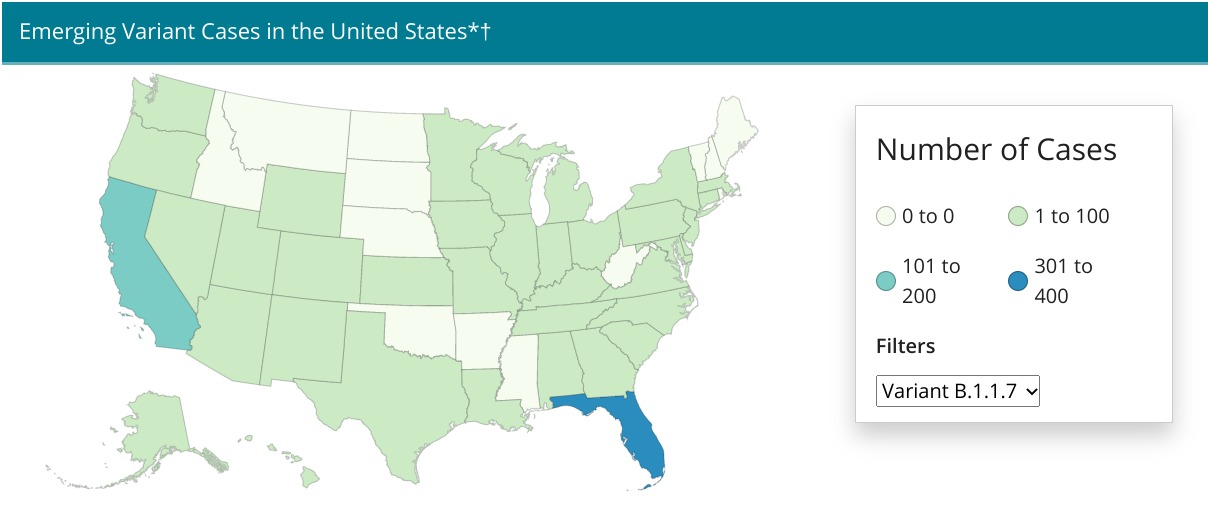
CONCORD, NH – The New Hampshire Department of Health and Human Services (DHHS) is announcing that the B.1.1.7 variant (the “U.K. variant”) of the COVID-19 coronavirus was detected in a NH resident for the first time.
The person infected with the variant virus is an adult resident of Hillsborough county who had close contact with someone diagnosed with COVID-19 after international travel. While this person did not travel, this detection of the variant virus is associated with international travel for this reason. Contact tracing has identified close household contacts, but no other community exposures have been identified. Public health isolation, quarantine and testing guidance was followed, including testing of all close household contacts to identify asymptomatic infection. As a result, there is not believed to be risk to the community from this case.
“The presence of a COVID-19 variant in New Hampshire is not surprising, and we will likely see increasing numbers of infections from the B.1.1.7 variant,” said Dr. Benjamin Chan, State Epidemiologist. “The CDC has estimated that the variant will likely become the predominant circulating variant in the U.S. in the near future. The best way to avoid exposure to this highly contagious variant is to wear a mask, social distance and frequent hand washing. We continue to recommend that any person with new or unexplained symptoms of COVID-19 be tested for COVID-19.”
The B.1.1.7 variant was identified because DHHS has increased monitoring in collected specimens for COVID-19 variants due to their increasing presence worldwide. To date, the B.1.1.7 variant has been identified in about 86 countries and in more than 37 states, with more than 980 cases in the United States. According to studies from the UK, the B.1.1.7 variant has been shown to be greater than 50 percent more infectious and transmissible. However, the COVID-19 vaccines appear to be highly effective at preventing COVID-19 from this variant.
COVID-19 continues to circulate in our communities, so all people need to protect themselves and help prevent further community spread, by:
- Wash your hands often with soap and water for at least 20 seconds or use an alcohol-based hand sanitizer that contains at least 60% alcohol if soap and water are not available.
- Avoid close contact with others. When outside your home, keep a distance of at least 6 feet between yourself and others. This is known as social distancing.
- Wear a cloth face covering that covers your mouth and nose to protect others when in public areas.
- Cover your mouth and nose with a tissue when you cough or sneeze, then throw the tissue in the trash and wash your hands.
- Do not touch your eyes, nose, or mouth with unwashed hands.
- Stay home if you have a fever or are not feeling well.
- Clean and disinfect frequently touched objects and surfaces.
More on B.1.1.7 lineage (a.k.a. 20I/501Y.V1 Variant from the CDC
- This variant has a mutation in the receptor-binding domain (RBD) of the spike protein at position 501, where the amino acid asparagine (N) has been replaced with tyrosine (Y). The shorthand for this mutation is N501Y. This variant also has several other mutations, including:
- 69/70 deletion: occurred spontaneously many times and likely leads to a conformational change in the spike protein
- P681H: near the S1/S2 furin cleavage site, a site with high variability in coronaviruses. This mutation has also emerged spontaneously multiple times.
- This variant is estimated to have first emerged in the UK during September 2020.
- Since December 20, 2020, several countries have reported cases of the B.1.1.7 lineage, including the United States.
- This variant is associated with increased transmissibility (i.e., more efficient and rapid transmission).
- In January 2021, scientists from UK reported evidence[1] that suggests the B.1.1.7 variant may be associated with an increased risk of death compared with other variants.
- Early reports found no evidence to suggest that the variant has any impact on the severity of disease or vaccine efficacy.[2],[3],[4]
For more information from the U.S. Centers for Disease Control and Infection about new COVID-19 variants, please visit cdc.gov/coronavirus/2019-ncov/transmission/variant.html. For more information on COVID-19 in New Hampshire, please visit the DHHS COVID-19 webpage at https://www.nh.gov/covid19. Information on how to access the COVID-19 vaccine is available at https://www.vaccines.nh.gov/.







